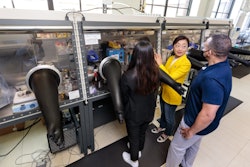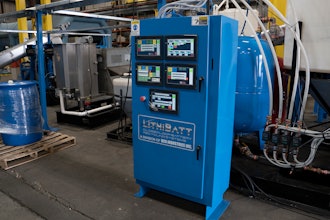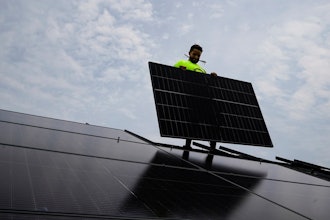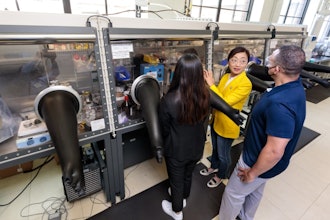
When energy giant Dominion Resources Inc. wanted $30 million in public funds to help build a pipeline that would fuel a new Dominion power plant, the Virginia tobacco commission was happy to oblige.
So happy, in fact, that the commission gave away millions of dollars more than commission staff calculated was necessary, records obtained by The Associated Press show.
Created 15 years ago to spend Virginia's portion of the national tobacco settlement, the Tobacco Indemnification and Community Revitalization Commission has doled out more than $1 billion on a wide range of projects in an effort to spur economic development in southwest and Southside Virginia. Led by powerful GOP lawmakers in recent years, the commission has come under fire for what critics say is an opaque, haphazard system of awarding grants often based on political considerations.
The commission approved the first $10 million grant aimed at inducing Dominion to build a natural gas-fired power plant in Brunswick County in 2012 and has subsequently approved two more grants of the same amount.
Commission staffers told the state's inspector general that the first $10 million installment should have only been $6.5 million based on the staff calculations. The staff used a model that includes local unemployment rates, prevailing wage rates and capital investment levels to calculate suggested grant amounts.
"However, as explained to use by the commission staff, due to the pressure to pass the program, an award of $10 million for each of 3 years ... was passed to build a natural gas-based power plant," according to a draft inspector general's report obtained by AP through a public records request.
The draft finding doesn't specifically describe the pressure other than to say it came from former Gov. Bob McDonnell's office. IG spokeswoman Jenny Fischer said the draft finding wasn't included in the IG's final report because it was "deemed to be an opinion" of the commission's management and no corroborating evidence, like emails or text messages, was found to support the commission staff's allegations.
Ned Stephenson, deputy director of the commission, declined to discuss the nature of the alleged political pressure.
McDonnell's attorneys John L. Brownlee and Henry W. Asbill said in a statement that "Dominion never asked the governor for any financial assistance regarding this project" and commission members approved funding "at a level its members deemed appropriate."
At McDonnell's corruption trial earlier this year, McDonnell testified he could not influence the tobacco commission's spending.
"They are an independent commission and they make their own decisions," he said.
McDonnell is awaiting sentencing after a jury found him guilty of illegally helping a dietary supplement maker in exchange for receiving more than $165,000 in gifts and loans.
David Botkins, a spokesman for Dominion, said the company did not lobby for the tobacco commission grant.
Dominion is without peer in terms of political sway in Virginia and routinely gets friendly legislation passed with broad bipartisan support. The Fortune 500 company is the single biggest donor to state-level politicians, as well as one of the biggest gift givers — often treating lawmakers to Washington Redskins games or paying for them to attend events like the Masters golf tournament in Georgia. CEO Thomas Farrell II and McDonnell are childhood friends.
Though Dominion is listed as the beneficiary on grant's applications and is a co-signer on the final contracts, the tobacco commission money has not gone directly to the company. Instead, the funds have gone to pipeline company Transco in order to lower construction cost of a $300 million, 100-mile pipeline that will largely run parallel to an existing line in southern Virginia and supply gas to a $1.3 billion natural gas power plant Dominion is building in Brunswick County.
The lower construction costs allow Dominion to buy gas at lower rates. Dominion said those savings will be passed on to its consumers.
The commission is made up of 31 voting members, which currently include several Republican lawmakers. The commission also has a small staff that evaluates proposals and calculates recommended grant amounts.
The final IG report, issued in January, faulted the commission for voting to approve the first $10 million installment without even discussing the lower amount calculated by staff.
"If an award exceeds the recommended amount, the commission should justify the excess," the final IG report said.
Sen. Frank Ruff, the commission's vice chairman, said he does not recall every hearing the $6.5 million figure discussed. Still, he said he still supports the full $30 million worth of grants, which he said likely helped Dominion gain approval from the State Corporation Commission to build the plant.
The Dominion power plant is one of the biggest single investments in Brunswick County and has been hailed as a way to boost the region's economy. The plant is currently under construction near Lawrenceville, a town that has struggled with the closing of a state prison and small college.
Dominion might have chosen the Brunswick site even without the commission's grant.
Dominion vice president Jim Eck told commission members at a May 2012 meeting that the grant was needed to help — in part— induce Dominion to choose the Brunswick location over a competing site.
In its application with the State Corporation Commission, Dominion said that it chose Brunswick location over a competing site in Chesterfield County, which is about 65 miles north, for a number of reasons. They include that the Brunswick site had the capacity to build another power plant in the future, and because the rural Brunswick County had lower risks associated with acquiring necessary permits. Chesterfield is a Richmond suburb and one of the state's most populated counties with more than 300,000 residents. Brunswick, by contrast, has about 17,000 residents.
In an interview with AP, Eck said many factors, including the tobacco commission's grant, were used to decide where to put the plant.
"I cannot say that one factor would individually tip the scale," he said.
Ruff said the main reason for approving the commission grant wasn't to put a new power plant in Brunswick County, but to get a new pipeline built so that southern Virginia can attract energy-hungry manufacturers along the pipeline's route.
"It had very little to do with Dominion," Ruff said.
Some lawmakers voiced concerns at the May 2012 meeting that the proposed contract with Transco lacked specifics on what the future capacity for additional natural gas would be once the pipeline was built and there was no one at the meeting with the expertise to answer their questions.
"I think we ought to be able to ask questions and find out what's happening," Del. Tommy Wright said, according to a transcript of the hearing. "Having said that, I still support the project."
Not all of the new gas capacity will stay in state. After the commission approved the first $10 million installment, Transco signed a contract to provide additional gas from the new pipeline to a North Carolina-based energy company.
Transco spokesman Tom Droege said the addition of the out-of-state company will lower the rate for Dominion customers "through the economics of scale."
Critics of the commission, including Democratic Gov. Terry McAuliffe, have pledged to push for changes in how it operates. A former commissioner stole $4 million from the commission and is serving a 10-year prison sentence, and the commission is part of a federal investigation into the abrupt resignation of a former Democratic state senator who was being considered for high paying job at the commission at the time of his resignation. His decision to quit the Senate gave Republicans control of the upper chamber.






















